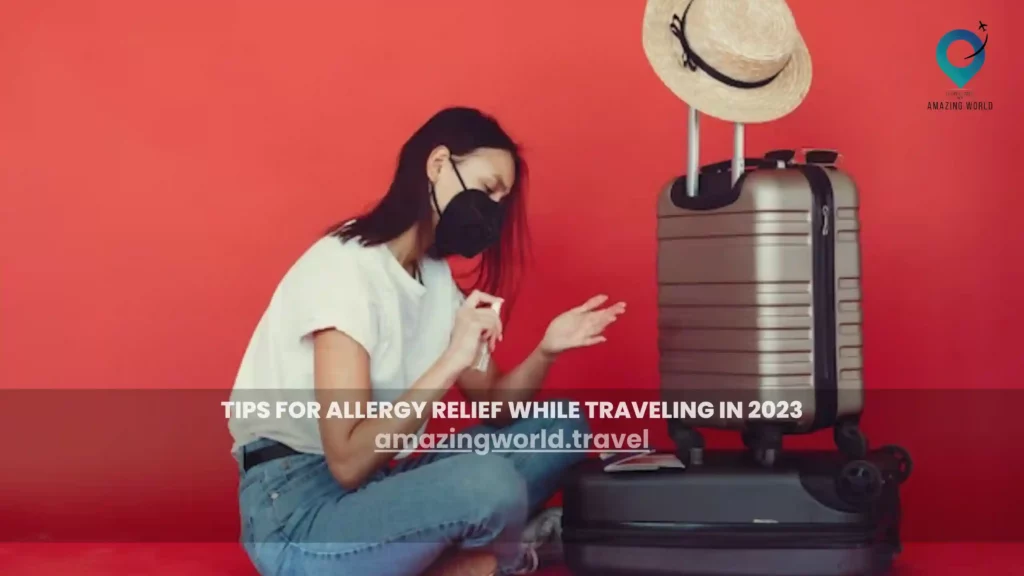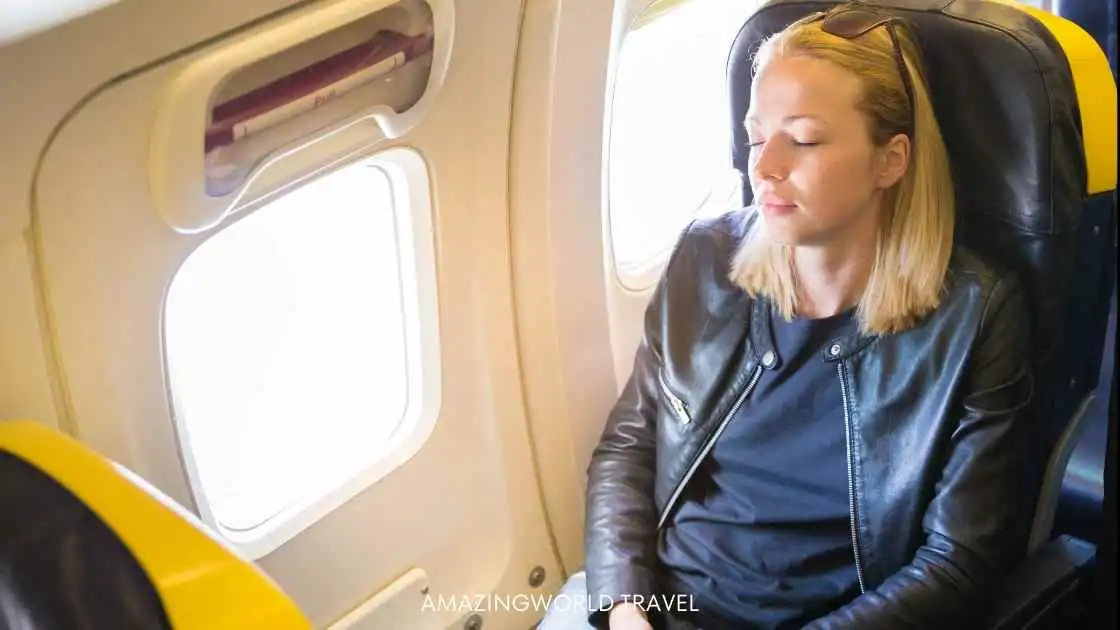20 Essential Tips for Allergy Relief While Traveling in 2023

Are you ready to embark on an unforgettable journey, exploring new horizons and making cherished memories? While travel opens doors to exciting experiences, it also exposes us to potential allergens that can put a damper on our escapades.
Fear not, wanderlust enthusiasts, as we unveil a travel guide designed to keep your allergies at bay! Whether you’re chasing sunsets on sandy shores or venturing through lush landscapes, managing allergies is essential to reveling in every moment.
In this comprehensive article, we’ve curated 20 expert tips to ensure your trip remains sneeze and sniffle-free, letting you embrace the beauty of travel without worry. From savvy preparation to savvy choices, let’s embark on a symptom-free adventure together!
1. Plan Ahead for Allergies
Before embarking on your journey, conduct thorough research on your travel destination’s allergen exposure and pollen levels. This information will help you prepare for potential triggers and take appropriate precautions.
Additionally, pack all necessary allergy medications and an allergy action plan, ensuring you have everything you need to manage allergies while on the go. If you have food allergies, check the airline’s food allergy policies and obtain a doctor’s note for carrying medications, which can help avoid potential travel disruptions.
2. Choose Allergy-Friendly Accommodations
Opt for accommodations that prioritize allergen reduction, such as hypoallergenic hotel rooms with clean air filters and allergen-free bedding. Consider staying in pet-free and smoke-free hotels to minimize exposure to common allergens. Communicate your allergy needs to the hotel staff before arrival to ensure a comfortable stay.
3. Manage Air Quality
Maintaining good air quality in your surroundings can significantly alleviate allergy symptoms. Use a high-quality air purifier in your hotel room, and keep windows closed to minimize outdoor allergens. When it comes to transportation, opt for allergy-friendly options like trains with effective air filtration systems. For flights, carry a travel-sized saline spray to keep your nasal passages moist.
4. Pack Allergy-Friendly Snacks
When traveling with allergies, packing allergy-friendly snacks is essential to ensure you have safe and enjoyable munching options throughout your journey. Finding suitable snacks on the go can be challenging, especially in unfamiliar places where allergen-free choices might be limited. To avoid potential allergen exposure and hunger-induced frustration, follow these tips for packing allergy-friendly snacks:
- Read Labels Carefully: Before purchasing snacks, carefully read the ingredient labels to identify any potential allergens. Avoid snacks that contain ingredients you are allergic to, and opt for certified allergy-friendly products whenever possible.
- Prep Snacks at Home: Consider preparing allergy-friendly snacks at home to guarantee their safety and quality. Homemade granola bars, trail mixes, or allergen-free cookies are great options.
- Portion Control: Divide snacks into smaller portions and pack them in resealable bags or containers. This not only helps with portion control but also ensures easy access during your travels.
- Fresh Fruits and Vegetables: Fruits like apples, grapes, and carrots, along with pre-cut veggies, make excellent and nutritious allergy-friendly snacks. Keep them in a cooler or insulated bag for freshness.
- Dried Fruits and Nuts: If you’re not allergic to nuts, consider packing allergy-safe varieties such as almonds, cashews, or pistachios. Combine them with dried fruits for a satisfying and energizing snack mix.
Remember to carry enough snacks to sustain you throughout your journey, as unexpected delays might occur during travel. By planning ahead and packing allergy-friendly snacks, you can focus on exploring your destination with peace of mind and a satisfied appetite.
5. Stay Hydrated
Staying hydrated is crucial for allergy relief. Drinking plenty of water can keep your nasal passages hydrated and reduce allergy symptoms. However, it’s best to avoid alcohol and caffeinated beverages, as they can cause dehydration and worsen allergy-related discomfort.
6. Dress Appropriately
Dressing appropriately is crucial for allergy relief while traveling, especially for those prone to pollen allergies. To shield yourself from pollen, wearing sunglasses and a wide-brimmed hat can provide effective protection for your eyes and face, reducing the chances of irritation.
Additionally, opting for loose-fitting, long-sleeved clothing is beneficial as it minimizes skin exposure to allergens present in the air. By covering up with long-sleeved garments, you can create a barrier between your skin and potential allergens, helping to alleviate allergy symptoms.
Whether exploring natural landscapes, strolling through gardens, or engaging in outdoor activities, dressing appropriately can make a significant difference in preventing allergy flare-ups and ensuring a more comfortable and enjoyable travel experience.
7. Be Prepared for Weather Changes
Different climates can trigger allergies, so it’s essential to pack allergy essentials based on your destination’s climate. Carry nasal sprays, antihistamines, and eye drops to manage symptoms effectively. Stay informed about local weather forecasts to anticipate allergy triggers during your trip.
8. Carry a Travel-Sized First Aid Kit
Include essential items like band-aids, antiseptic wipes, and hydrocortisone cream to address potential allergy-related skin reactions. For those with severe allergies, carry extra epinephrine auto-injectors for emergency situations.
9. Minimize Exposure to Allergens
Minimizing exposure to allergens is a fundamental aspect of managing allergies while traveling. Allergens are substances that can trigger allergic reactions in susceptible individuals, and they can be found both indoors and outdoors. Here are some essential tips to help you minimize exposure to allergens during your trip:
- Avoid Peak Pollen Hours: Pollen levels are typically higher during specific times of the day, such as early morning and late afternoon. If you have pollen allergies, try to limit outdoor activities during these peak hours.
- Keep Windows Closed: Whether you’re in your accommodation or using transportation, keep windows closed to prevent outdoor allergens from entering indoor spaces.
- Use Air Purifiers: If you’re sensitive to indoor allergens, consider using an air purifier in your hotel room or accommodation to improve air quality and reduce allergen exposure.
- Avoid Freshly Mowed Grass and Blooming Flowers: When exploring outdoor areas, be mindful of freshly mowed grass and blooming flowers, as they release allergens into the air.
- Check Toiletries and Cleaning Products: In your accommodation, inspect toiletries and cleaning products for potential allergens. If needed, use your own products to avoid skin or respiratory reactions.
- Wash Hands Frequently: Regularly washing your hands helps remove allergens you may have come into contact with while exploring or touching surfaces.
Minimizing exposure to allergens requires proactive planning and a keen awareness of potential triggers. By implementing these strategies, you can significantly reduce the risk of allergy symptoms during your travels, allowing you to fully enjoy your trip without the discomfort of allergic reactions.
10. Be Cautious with Hotel Amenities
When staying in hotels, it’s essential to be careful with the amenities they provide. Some amenities like pillows, bedding, and toiletries may contain allergens that can trigger allergic reactions. If you have specific allergies, consider bringing your own hypoallergenic pillows and bedding covers to ensure a comfortable sleep.
Also, check the ingredients of the hotel toiletries to avoid using products that could cause skin irritations or allergic responses. Being cautious with hotel amenities helps you stay safe and prevents allergy flare-ups during your stay, allowing you to enjoy your trip to the fullest.
11. Choose Allergy-Friendly Destinations
Choosing allergy-friendly destinations is a smart way to have a more enjoyable and symptom-free travel experience, especially for individuals with allergies. Allergy-friendly destinations are places known for their low allergen levels and a reduced likelihood of triggering allergic reactions. Coastal areas and higher elevations are often considered allergy-friendly as they tend to have cleaner air and fewer allergens.
When planning your trip, consider destinations that are less prone to your specific allergens. Doing some research beforehand and consulting with your healthcare provider can help you identify suitable locations that align with your allergy needs.
By opting for allergy-friendly destinations, you can explore new places with peace of mind and focus on creating wonderful memories, free from the discomfort of allergies.
12. Stay Informed on Local Healthcare
Staying informed on local healthcare options is crucial when traveling, especially for individuals with allergies. Before your trip, take the time to research nearby hospitals, clinics, and medical facilities at your destination. Knowing where to seek medical help in case of severe allergic reactions can provide reassurance and save valuable time in emergency situations.
13. Keep Allergy Records Handy
Store digital copies of your allergy-related medical documents and prescriptions on your phone or cloud storage for easy access. Consider wearing a medical ID bracelet or carrying a card with allergy information, especially if you have severe allergies.
14. Keep Allergy-Free Zone in Your Luggage
Creating an allergy-free zone in your luggage is a practical and effective way to ensure that your allergy-friendly items remain separate from potential allergens during your travels. By using resealable bags or compartments, you can keep allergy-friendly snacks, medications, and toiletries in one designated area within your luggage.
Separating these items helps prevent cross-contamination, which can occur when allergen-free items come into contact with allergens, potentially triggering allergic reactions. Keeping your allergy essentials organized also makes them easily accessible, allowing you to quickly find what you need without rummaging through your entire luggage.
15. Maintain Personal Hygiene
Maintaining personal hygiene is crucial for allergy relief while traveling. Regularly washing your hands helps remove allergens you might have come into contact with during your explorations or from touching surfaces. This simple practice can prevent allergens from transferring to your face or causing skin irritations.
Additionally, using allergy-friendly hand sanitizers or wipes when water is not available can further minimize allergen exposure. By prioritizing personal hygiene, you can significantly reduce the risk of allergy symptoms and ensure a more comfortable and enjoyable travel experience.
16. Seek Local Knowledge
When exploring new destinations, seeking local knowledge can be invaluable for allergy-prone travelers. Asking locals or hotel staff for allergy-safe dining recommendations allows you to enjoy delicious meals without worrying about potential allergens. Inquire about nearby allergen-free stores or pharmacies to restock your allergy medications and supplies.
Locals can provide valuable insights into allergen levels, local climate effects on allergies, and any specific precautions you should take. Being open to seeking local knowledge enhances your travel experience and keeps you well-prepared for allergy management in unfamiliar surroundings.
17. Take Precautions with Souvenirs
While souvenirs can be delightful reminders of your travels, it’s essential to take precautions to avoid potential allergens or irritants. Some souvenirs, such as scented candles or perfumes, may trigger allergies or respiratory sensitivities.
Check ingredient lists on beauty and skincare products before purchasing to prevent any allergic reactions. Opt for non-allergenic souvenirs or choose items made from natural materials. By being cautious with souvenirs, you can cherish your travel memories without compromising your allergy management efforts.
18. Manage Pet Allergies
For individuals with pet allergies, managing pet exposure during travel is essential to ensure a comfortable and symptom-free trip. If you’re staying at a friend or family member’s home, inform them about your pet allergies beforehand. They can take steps to minimize allergen exposure, such as keeping pets out of the guest room or providing allergy-friendly accommodations.
When booking accommodations, choose pet-free options or hotels that offer allergy-friendly pet rooms. Some hotels have designated pet-free floors to cater to guests with allergies.
If you’ll be encountering pets during your travels, consider carrying antihistamines or other allergy medications as a precaution. Washing your hands after touching animals can also help reduce allergen exposure.
19. Stay Calm and Relax
During travel, it’s essential to manage stress and stay calm, as stress can exacerbate allergy symptoms. Engaging in relaxation techniques such as deep breathing, meditation, or yoga can help you remain composed and alleviate allergy-related discomfort.
Prioritizing self-care and ensuring you get enough rest can also contribute to managing allergies. Adequate rest supports your immune system and overall well-being, making it easier to cope with allergens.
20. Follow Up with Healthcare Provider
After your trip, it’s essential to follow up with your healthcare provider, especially if you experienced new allergy triggers during travel. Discuss your travel experience, any allergy symptoms you encountered, and how well your allergy management strategies worked.
Your healthcare provider can offer additional advice or adjust your allergy treatment plan if needed. By keeping your healthcare provider informed, you can ensure ongoing allergy management and be better prepared for future travels.
Conclusion
Managing allergies while traveling is crucial to ensure a pleasant and symptom-free journey. By planning ahead, choosing allergy-friendly accommodations, managing air quality, and packing allergy essentials, you can enjoy your adventures to the fullest.
Staying informed about local healthcare options and following these 20 essential tips will help you have a memorable and allergy-free travel experience.
How much did you like Our detailed 20 Essential Tips for Allergy Relief While Traveling in 2023? Review Also, please share these Blogs with your friends on social media.
Related Article –
- Road Trips Ideas | 12 Tips to Prepare Your Car for a Long Road Trip?
- 150 Best Places to Visit in the United States In 2023
- Road Trip With Kids
- How to Stay Awake While Driving Long Distances
- Audiobooks to Listen to On Your Road Trip
- How to Create an Epic Itinerary Road Trip
- Best Rental Cars For Travel Adventures
Tips for Allergy Relief While Traveling in 2023 FAQs
Can stress worsen allergy symptoms while traveling?
Yes, stress can exacerbate allergy symptoms. During travel, practicing relaxation techniques and prioritizing self-care can help manage stress and reduce allergy-related discomfort.
How can I ensure safe and allergy-friendly dining options during my trip?
To find safe dining options, ask locals or hotel staff for allergy-safe restaurant recommendations. Inquire about nearby allergen-free stores or pharmacies for allergy-friendly food choices.
Is it necessary to inform friends or family about my pet allergies before staying at their homes?
Yes, informing friends or family about your pet allergies before your visit is essential. This allows them to take necessary precautions to make their homes more comfortable for you.
Can I alleviate allergy symptoms while flying by wearing a face mask?
Yes, wearing a face mask during a flight can help reduce exposure to airborne allergens, providing some relief for allergy sufferers.
Are there specific items to avoid purchasing as souvenirs to prevent allergic reactions?
Yes, it’s advisable to avoid purchasing scented candles, perfumes, or beauty products that may contain allergens or irritants to prevent allergic reactions while using them.
What steps can I take to minimize allergen exposure during outdoor activities?
To minimize allergen exposure during outdoor activities, avoid going out during peak pollen hours and stay away from freshly mowed grass and blooming flowers.
Can language barriers affect my ability to communicate allergies to healthcare providers in a foreign country?
Language barriers can sometimes be challenging, but learning basic medical phrases in the local language and carrying allergy-related medical documents can help you effectively communicate your allergies to healthcare providers in a foreign country.
How can I keep my allergy essentials organized while traveling?
Use resealable bags to store allergy-friendly snacks, medications, and toiletries separately from other items in your luggage. This will prevent cross-contamination and make your essentials easily accessible.
Is it important to carry extra epinephrine auto-injectors for severe allergic reactions during travel?
Yes, carrying extra epinephrine auto-injectors is crucial for travelers with severe allergies, as it ensures quick access to life-saving medication in case of an emergency.
Can wearing loose-fitting, long-sleeved clothing help reduce allergy symptoms while traveling?
Yes, wearing loose-fitting, long-sleeved clothing can minimize skin exposure to allergens, providing some relief for travelers prone to skin allergies.

Meet David Hoper, a passionate travel Blog writer with 7+ years of experience in travel content. Through his exemplary storytelling and engaging narratives, he shares his experiences and brings destinations to life. With a keen eye for detail and a love for exploration, he has cultivated a diverse portfolio of travel blogs that inspire and inform readers worldwide.









